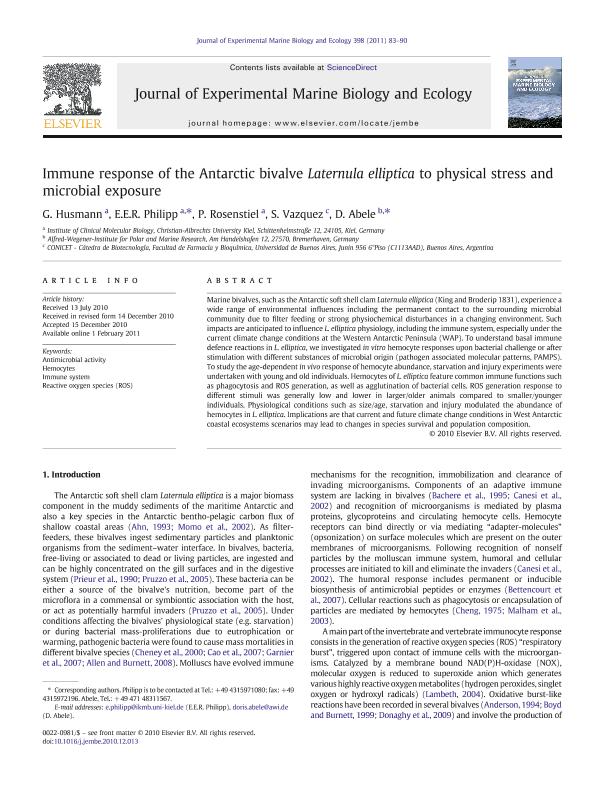Artículo
Immune response of the Antarctic bivalve Laternula elliptica to physical stress and microbial exposure
Fecha de publicación:
02/2011
Editorial:
Elsevier Science
Revista:
Journal of Experimental Marine Biology and Ecology
ISSN:
0022-0981
Idioma:
Inglés
Tipo de recurso:
Artículo publicado
Clasificación temática:
Resumen
Marine bivalves, such as the Antarctic soft shell clam Laternula elliptica (King and Broderip 1831), experience a wide range of environmental influences including the permanent contact to the surrounding microbial community due to filter feeding or strong physiochemical disturbances in a changing environment. Such impacts are anticipated to influence L. elliptica physiology, including the immune system, especially under the current climate change conditions at the Western Antarctic Peninsula (WAP). To understand basal immune defence reactions in L. elliptica, we investigated in vitro hemocyte responses upon bacterial challenge or after stimulation with different substances of microbial origin (pathogen associated molecular patterns, PAMPS). To study the age-dependent in vivo response of hemocyte abundance, starvation and injury experiments were undertaken with young and old individuals. Hemocytes of L. elliptica feature common immune functions such as phagocytosis and ROS generation, as well as agglutination of bacterial cells. ROS generation response to different stimuli was generally low and lower in larger/older animals compared to smaller/younger individuals. Physiological conditions such as size/age, starvation and injury modulated the abundance of hemocytes in L. elliptica. Implications are that current and future climate change conditions in West Antarctic coastal ecosystems scenarios may lead to changes in species survival and population composition.
Archivos asociados
Licencia
Identificadores
Colecciones
Articulos(SEDE CENTRAL)
Articulos de SEDE CENTRAL
Articulos de SEDE CENTRAL
Citación
Husmann, G.; Philipp, E. E. R.; Rosenstiel, P.; Vázquez, Susana Claudia; Abele, D.; Immune response of the Antarctic bivalve Laternula elliptica to physical stress and microbial exposure; Elsevier Science; Journal of Experimental Marine Biology and Ecology; 398; 1-2; 2-2011; 83-90
Compartir
Altmétricas




